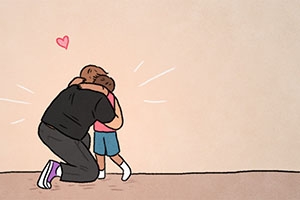Communications
Commuter Challenge Game Inspires Empathy, Engagement

It started with the goal to explore the intersection of games and journalism, and merge those two worlds together. It ended with an engaging game that inspires empathy and taps into a groundswell of frustration around DC Metro’s SmartTrack initiative, developed through a partnership between NPR’s WAMU 88.5 and the American University Game Lab.
“JOLT is a great intersection of technology and journalism, and is right on the cutting edge of where media is going,” said Maggie Farley.
A couple of years ago, Dean Jeff Rutenbeck of the School of Communication at American University secured a grant from the Knight foundation in an effort to explore and bring game design thinking to journalism. This project was named the JOLT program, which stands for Journalism Leadership Transformation.
Then, three student fellows who were master students in the game program, as well as a handful of professional fellows, were chosen to be a part of the project. A couple of SOC professors Lindsay Grace, Associate Professor and AU Game Lab Director, and Amy Eisman, Media Entrepreneurship and Special Programs Director, took part in the project to see if embedding a game in a newsroom can work.
“We spent a whole year of exploring, studying, holding conferences, researching and creating, so these two worlds can come together,” Eisman said.
Initially, the embedding process didn’t work exactly like the team wanted it to. “WAMU had its business and we had our classes,” Eisman said, “But eventually we agreed on a topic.”
After some exploratory meetings between the dean, faculty and fellows, they decided to do something to complement WAMU’s new Metropocalypse podcast. It was around the time metro was going through Safe Track and the metro was causing commuters inconveniences.
Maggie Farley, a professional fellow, did the reporting, and Joyce Rice, graduate fellow, created and built the game they later named Commuter Challenge.
Farley interviewed Metro customers at several stations to get some information about how the SafeTrack plan was affecting their daily commute. Most complained about the value of their time and money. They feared getting late to work and risking getting fired, so they would spend money out of their budget on Uber and go broke.
“I rode the shuttle buses and trains along with the people I interviewed and I found the challenges that the riders faced were the most compelling — many of the people worked hourly jobs with little flexibility, and had fewer alternatives to get to work,” Farley said.
Once they had their answers from customers gathered, Farley and Rice started thinking about how to come up with ways that players might experience this issue in an engaging way. “We decided that time and money pressure were the best levers to tell this story,” Rice said.
The main character in the game was based on a man Farley interviewed, he worked in a restaurant in downtown DC, and got fired when the Metro disruptions made him late three times in two weeks.
“We tried to convey those daily struggles and cascading consequences through the game,” Farley added.
That’s one of the many reasons that made the game popular, successful and relatable. “We’re very pleased on two levels; one people are saying that the game makes them see what it’s really like to be on a tight budget, have a mean boss and have a kid in day care, you know it’s hard,” Eisman said, “Two, I think it truly shows people how hard it is to depend on metro when you’re counting every penny.”
Rice, who graduated from the game design grad program in December of 2016, said that having a contact at WAMU helped with the partnership process. “We had good conversations about games and journalism during several workshops with WAMU and we decided we would be good potential partners,” Rice said.
The JOLT team decided to join hands with WAMU for two main reasons; one is because of the fact that they are part of the American University system and second, their employees are always open to experimenting with forms of storytelling. “We were both trying to find ways to make information more engaging and relevant, so it was a great match,” Farley said.
The project was realized through the strong support of two AU faculty, Amy Eisman, who developed and facilitated the partnership with WAMU, and Lindsay Grace, who helped the student fellows refine the idea of the game.
“Their advice and support were indispensable to getting this project off the ground,” Rice said.
Farley, who has 14 years of Foreign Correspondence experience, said that the hardest part of the project was creating the path to an area that is just beginning to be explored. “We hope to do more, and to offer a blueprint to news organizations who are interested in using game design and theory for news engagement,” she said.
Rice said that working across the industry of games has the ability to make big waves in journalism; “Games and play have the potential to transform how we communicate about systems, and are therefore extremely well-suited to non-fiction projects,” she said.
Other recent JoLT projects include a trivia game for Vox Media's Polygon pegged to anniversary of Final Fantasy VII and Factitious, a game that challenges players distinguish between fake news and real.
Learn more about American University’s MA in Game Design.
